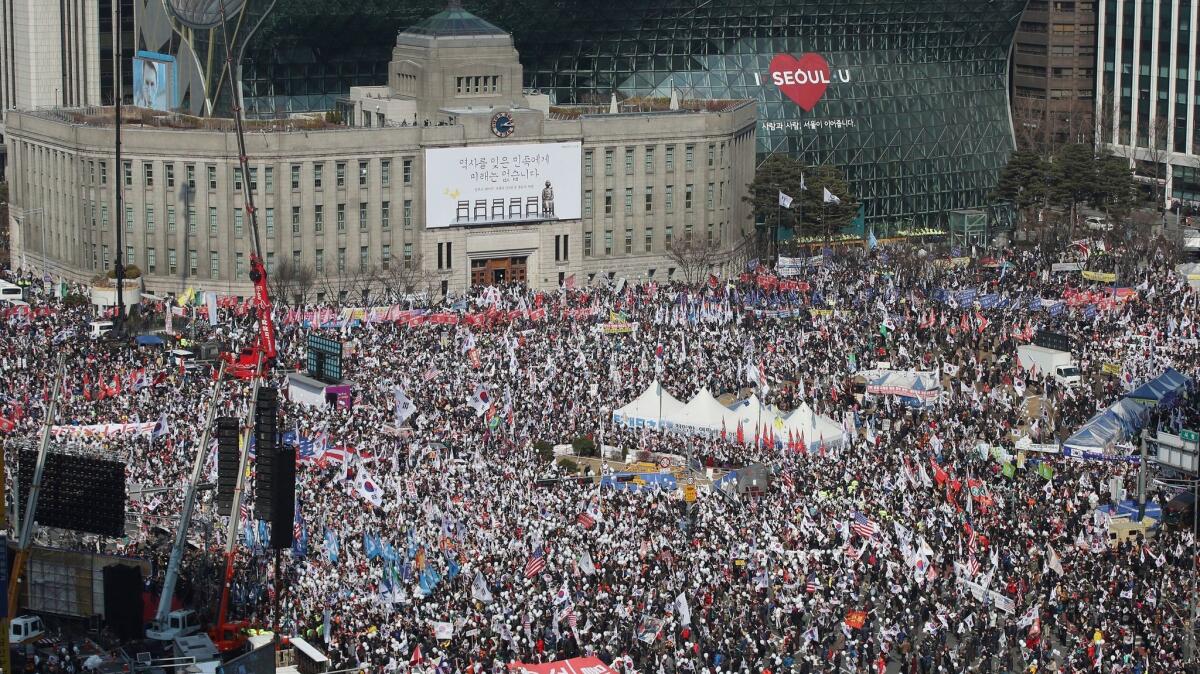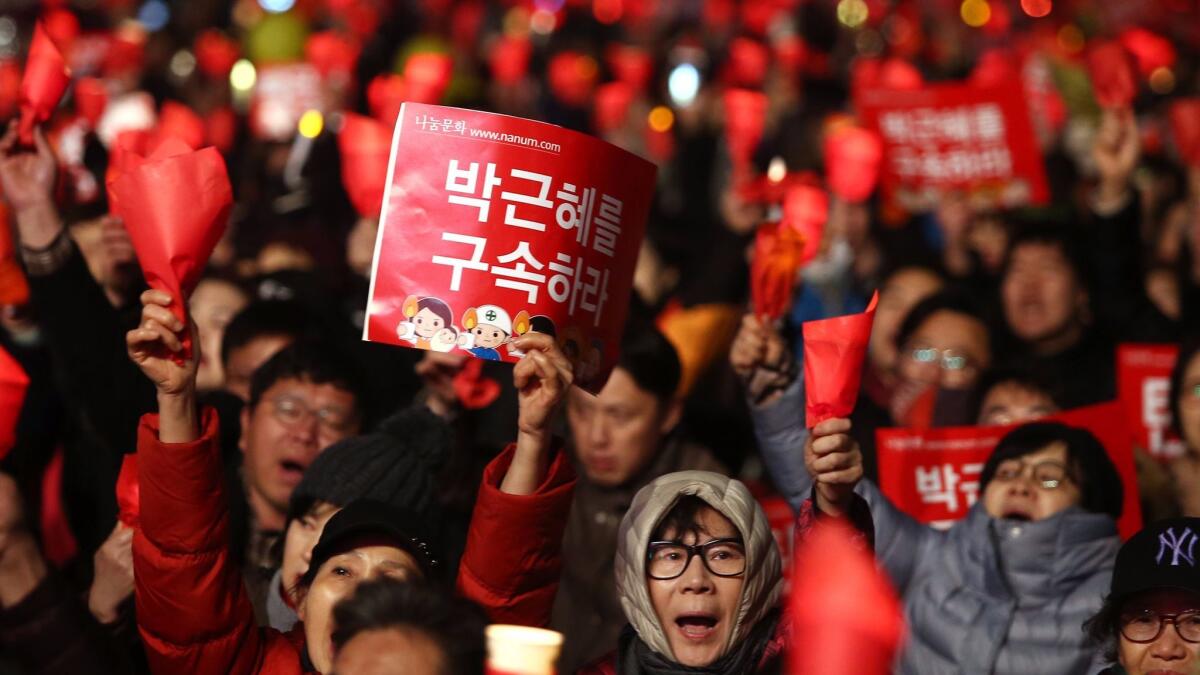Will South Korea’s impeached president be removed from office? Court to announce verdict Friday

- Share via
Reporting from SEOUL, SOUTH KOREA — The public corruption scandal that has rocked South Korea’s democracy in recent months got a step closer to resolution on Wednesday as a court confirmed its plans to announce the fate of the country’s impeached president later this week.
The decision on whether to remove suspended President Park Geun-hye from office amid bribery allegations involving the country’s top conglomerate, Samsung Group, is expected Friday morning.
“It’s definitely an exciting time,” said Joung Hwang, a professor at Hankuk University of Foreign Studies Law School who has followed the case closely. “When the announcement will be made on live TV, I think virtually every Korean will be glued to the screen. It’s highly anticipated.”
The process to determine Park’s future began not long after the National Assembly, prompted in part by public outcry over the president’s decisions, impeached the embattled leader in December.
Park, 65, South Korea’s first female president, has been in power since 2013 — a tenure marked by controversy and what her critics say was ineffectual leadership and an autocratic style. Park has repeatedly apologized to the public and said she never acted outside the country’s national interest.
I apologize for hurting the people’s hearts with my carelessness in supervising my associates
— South Korea President Park Geun-hye
“I apologize for hurting the people’s hearts with my carelessness in supervising my associates,” she wrote in a statement last month to the court weighing whether to remove her from office.
The allegations against her and others atop the nation’s government and corporate systems have prompted widespread anger among the South Korean public. That’s led to massive but peaceful street rallies in recent months reminiscent of protests that led to the country’s democratization in the 1980s.
Millions of South Koreans — including families toting their young children — have attended the rallies across the country, calling for Park’s ouster. The rallies in Seoul have been the largest, with some stretching more than a mile.

Park was elected in 2012 and her downfall was swift after revelations last fall that a longtime confidant with no government title, Choi Soon-sil, gained access to sensitive government documents, including the president’s speeches.
Later came allegations that Choi, the daughter of a deceased cult leader who has been jailed in a sprawling corruption investigation, also used her close relationship with Park to extort millions of dollars from the country’s largest family-owned conglomerates, known as chaebol.
For months the judges on the nation’s constitutional court, which has final jurisdiction in impeachment cases, have held public hearings to weigh the myriad allegations in the impeachment case — both political and criminal.
Park’s removal, which opinion surveys show the public supports, would prompt a new presidential election within two months. The country’s prime minister, Hwang Kyo-ahn, would remain, as he is now, the interim president.
If the judges were to reject the impeachment, a regular election is scheduled to replace the term-limited Park in December, and she could remain in office until February of 2018. Several candidates, including Park’s opponent in the close 2012 presidential election, are preparing campaigns to succeed the embattled leader — either way.
Most everyone, it seems, has followed the scandal, and they appear eager for an outcome.
“They are all waiting, very intensely, to find out how the court is going to decide,” James Kim, a research fellow at the Asan Institute for Policy Studies in Seoul, said of the public. “My son’s friends, when they were over for his birthday in February — they are 10-year-olds, and they were talking about this.”
The three-month investigation ended this month, with prosecutors accusing Park of bribery. They allege she pressured payments of about $37 million to Choi-controlled firms from Samsung Group in exchange for help pushing through approval of a controversial merger between two of the tech giant’s affiliates.
The merger was seen as an effort to solidify third-generation dynastic control for Samsung Electronics Vice Chairman Lee Jae-yong, grandson of Lee Byung-chul, who founded the company in 1938.
The prosecutors alleged in their final report that the president — who, for now, has immunity from criminal charges — personally instructed the National Pension Service to vote for the controversial merger at a 2015 shareholders’ meeting.
“The core subject of this team’s investigation has been the abuse of power to monopolize state affairs for personal interest and the collusive links between business and politics,” said Park Young-soo, who led the investigation.
Authorities received approval to arrest Lee Jae-yong, 48, last month on charges of bribery, perjury, embezzlement, concealing gains from a criminal act and improperly diverting funds overseas. Lee Jae-yong — one of the country’s most powerful men who is reportedly worth about $6 billion — is considered heir apparent to lead Samsung.
He remains in jail, a fate his father, former Samsung chairman Lee Kun-hee — himself convicted of corporate malfeasance years ago — never endured.
Samsung has denied the allegations, saying the company looks forward to the facts being settled at trial.
As a result of the investigation, dozens of other people — including several associated with Park and her government — have been implicated in wrongdoing.
The prosecutors also alleged that the president helped create a “blacklist” of thousands of South Korean cultural figures who were seen as critical of her administration. They alleged the president’s former culture minister, Cho Yoon-sun, and her onetime chief of staff, Kim Ki-choon, joined in the effort, which prompted a recent lawsuit against the president and others allegedly involved by hundreds of artists.
The president has declined to speak with prosecutors, unlike others involved in the investigation. She could face criminal charges upon leaving office, and her lawyer this week called the investigation unfair and politically motivated.
The court’s looming decision on Park has sparked some speculation that the president, in an effort to preserve her legacy and avoid an impeachment verdict, might resign beforehand.
“There are different stories going around, with some people saying she’s going to resign,” said Kim, the Asan researcher. “There’s a whole new set of drama that could come after the announcement.”
Stiles is a special correspondent.
ALSO
Fearful immigrants in U.S. make perilous winter crossing to seek protection in Canada
North Korea bars Malaysians from leaving the country, and Malaysia strikes back
The teachers are unpaid and danger is ever present, but Mosul’s schools are reopening
More to Read
Sign up for Essential California
The most important California stories and recommendations in your inbox every morning.
You may occasionally receive promotional content from the Los Angeles Times.











